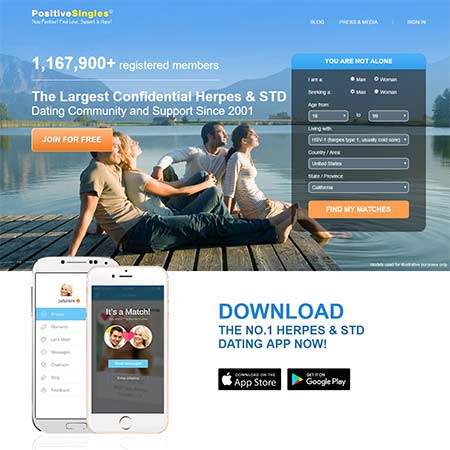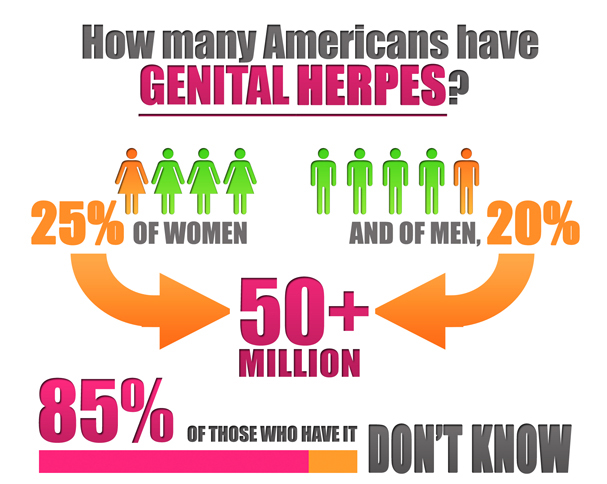Finding out that you have herpes is a serious bummer. You might feel mad, embarrassed, ashamed, or and are probably feeling uncertain about the future. Sit down and take a breath and take 30 minutes to read the following how to live with herpes article.
You’ll probably feel a lot better as time goes by, and you see that having herpes doesn’t have to be a big deal. People with herpes have relationships and live totally normal lives. You can do what you need, whether that’s learn how to live with herpes in a relationship or Living with Herpes is not that bad!
Get educated and informed about the herpes disease
You may spend some time to learn how to live with herpes. Do some research and learn all you can about the disease. Empowering yourself with knowledge can help you be confident around those who are ignorantly critical.
The following video from Dr. Handsfield. This has been one of the most knowledgeable bits of information that We have come across so far concerning herpes. Spend some time to view the following video.
Manage outbreak and know your trigger
You were probably diagnosed because you experienced an outbreak. It may have been scary and The first outbreak be extremely painful, and it’s important to see a doctor in case you need a prescription like Valocyclovir or Acyclovir. The sooner you start taking it, the more likely you are to curb the outbreak.
Depending on the health of the patient and the type of outbreaks (primary or recurrent), untreated outbreaks can last from 1 to 6 weeks. While the symptoms will heal by itself, however with the use of antiviral medications, they can significantly decrease the recovery time for a herpes outbreak in addition to decreasing the occurrence of future outbreaks.
With medication, outbreaks typically last less than a week. Daily consumption of antiviral herpes medication as a form of suppressive therapy can also aid to reduce recurring outbreaks by at least 70% to 80% per year.
Statistically, 8 out of every 10 people (for both sexes) who have a primary outbreak will also go on to have a recurrent attack within the first 6 months after the first outbreak. The average amount of recurrent outbreaks is approximately 2 to 3 times annually with each recurring outbreak lasting 3 to 14 days. A herpes infection may be considered chronic if outbreaks occur more than 5 times a year.
Some of the following factors may triggers genital herpes symptoms:
Remember that triggers may not be the same for everyone, and doctors are not certain how much lifestyle affects herpes symptoms. If you think one triggers your symptoms, ask your doctor what you should do about it.
Take prescription antiviral medications
Since there is no cure for genital herpes, treating it with antiviral medications can help heal outbreaks sooner and lessen the severity of recurrences. It may also minimize the chance of transmitting the virus to other people. It’s important to get a diagnosis and start treatment as soon as you have symptoms of genital herpes, which may lessen the severity of the virus in the long term.
Common medications for genital herpes are Acyclovir (Zovirax), Famciclovir (Famvir), and Valacyclovir (Valtrex). We are all different and react differently to meds. What works for one = doesn't for someone else.
Your doctor may advise taking medication only if you have symptoms or an actual outbreak, or she may recommend daily use even if no signs of an outbreak are present.
Prevent transmission of genital herpes to your partner.
Whether the disease is dormant or you are having an outbreak of lesions, you need to take steps to prevent your partner from contracting genital herpes. There are several way to minimize the risk of transmitting the disease to you or your partner.
Worry about possible transmission? Find a partner with herpes!

PositiveSingles is 2023 No.1 Herpes dating site and have been on the web for over 20 years. It has 1.7 million online people with herpes.
You can find thousands of nearby singles wiht herpes like you no matter you are looking for a casual relationship or long-term parters. Spend 3 minutes to place a profile and chat now.
Your Sex Life and Herpes
You can have a fulfilling sex life if you have genital herpes, even though it may be more complicated than it was before your diagnosis. Although safe sex techniques are not 100% effective, consistently using condoms and other barriers, and avoiding sex during outbreaks, will greatly reduce the likelihood that you will infect your partner.
If you are very recently diagnosed and you are going though the first outbreak, You may take things slowly for a month or two simply because your body has no antibodies to the virus so you will be more likely to have Outbreaks and asymptomatic shedding.
If you have gotten recurrent outbreaks, you may wait for 3 to 10 days after an outbreak, you can have sex again.. if u feel itching, or a slight tingle, or anything like that (aka prodromes), i would avoid sex for a few days until those feelings go away.
You might also consider taking antiviral drug therapy for genital herpes to reduce the amount of virus you shed. A recent study shows that daily suppressive therapy (taking a drug daily to sharply reduce the frequency of outbreaks) may help keep your partner from being infected.
Sex with herpes: Guidelines for a safe, fulfilling sex life
First sex after herpes diagnosis
Can masturbating spread herpes to my hand?
Do condoms prevent herpes? Not Really, the effectiveness of condoms
Will having herpes affect my pregnancy?
If you’ve had genital herpes for a while and you get pregnant, you probably don’t need to worry — it’s unlikely that you’ll give herpes to your baby during birth. But you should still let your doctor know you have genital herpes if you’re pregnant, no matter what.
If you get herpes while you’re pregnant, it’s a lot more dangerous — especially late in the pregnancy. It can cause a miscarriage or cause you to deliver too early.
If you give herpes to your baby during birth, it can cause brain damage or eye problems. If you have herpes sores when you go into labor, your doctor might suggest that you to have a C-section so you don’t pass the virus to your baby during delivery.
If your partner has herpes and you don’t, don’t have unprotected vaginal, anal, or oral sex when you’re pregnant, since that’s the most common way to get herpes. The doctor might tell your partner to take herpes medication during your pregnancy so they’re less likely to pass on the virus.
Oral herpes isn’t dangerous during pregnancy or birth. But if you have a cold sore after you give birth, don’t kiss your baby until the sore is totally healed. Read on how to protect your baby from herpes infection.
HIV Risk With Herpes
Having genital herpes can increase the risk of being infected with HIV, the virus that causes AIDS, and it can cause serious problems for people living with HIV.
People who have genital herpes sores are more likely to be infected with HIV during intercourse. When you develop a sore, the immune system tries to heal it, so there are many immune cells concentrated in that spot. Those are the cells that HIV infects. If HIV in semen, vaginal fluid, or blood comes in contact with a herpes sore, the risk for infection is high.
Herpes Is very Common. Know You Aren’t Alone
Millions and millions of people have herpes In fact, one-fifth of the American population is infected. 85% or more affected people remain unaware of their condition. — you’re definitely not alone. That means more than 5o million people in the United States are living with genital herpes. And according to statistics, 42 million of them don’t even know they have it. This isn’t something unheard of or new. Globally, an estimated 536 million people are infected.

Never allow your herpes to define who you are
Herpes is nothing but a common skin condition that has a bad stigma attached to it, which is unfortunately kept alive due to our very uneducated society. Most people get at least one STD in their lifetime, and having herpes or another STD is nothing to feel ashamed of or embarrassed about. It doesn’t mean you’re “dirty” or a bad person — it means you’re a normal human who got a really common infection. This is a life changing situation, you are strong enough to handle it. Life hasn’t been easy and there will still be more battles that we have to face, but you will survive and carry on.
You have herpes
Be aware of social stigmas
Even though sexual politics have progressed, there are often still social stigmas attached to genital herpes. These stigmas can cause you shame, stress, anxiety, or depression. Addressing the negative connotations and your own feelings associated with genital herpes can help you move forward and lead a normal life.
It will be helpful to view the video. "How To Not Let The Stigma Affect Your Everyday Mental Health".
Communicate with your current partners
Many people who are diagnosed with genital herpes for the first time assume – often incorrectly – that they got herpes from their most recent partner. Remember that herpes can remain dormant in your body for years so it can be difficult to tell when the herpes infected you. You can never know for certain how or where we got it....we can't know for how long we have had it and we certainly should NEVER assume someone has strayed. Herpes may lives within us whether we know it or not.
Should you tell your past sexual partners that you have genital herpes?
The answer is yes. The most ethical approach is to tell anyone whom was exposed to the virus and get tested. This is the hardest thing to do, and that’s why a lot of people won’t tell past partners to save themselves the embarrassment.
The other way to look at this is if the situation were reversed… If they had sex with you, then they found out they had an infection long after you were together, but there was a chance they had it while you were intimate with one another, would you want them to contact you so you could get tested, get treated (where applicable), and then make sexual health choices accordingly? Most people would answer a solemn ‘yes’ to that.It's an opportunity to share the knowledge, not the stigma.
You are empowering them to make their own choices. Even if they don’t wind up with herpes, the discussion you have with them might elicit safer sex practices and additional research that will only serve to help them and their future partners.
How to date with herpes
You have herpes, you can still date, and quite successfully too! Genital herpes doesn't detract from your many desirable qualities, which have drawn people to you in the past and will continue to make you a great catch. It may change your dating aspect in life, but it may even be for the better.
Having herpes may help you “weed out” certain individuals you just wouldnt want to be with. For example, someone that judges those for having this, someone who you couldn’t trust with keeping your diagnosis private, someone who only want sex, and so on. So aside from compatibility, you now keep these things in mind and qualities like trust and open-mindedness can be a great foundation for a relationship.
You do have to inform your partners before intimacy happens. And that’s a difficult fact, I know. But it doesn’t have to be as hard as it seems. There is a right way to tell someone you have herpes: Calmly, informatively, and aware. Let them know that having sex with you doesn’t necessarily mean they will get it. Let them know the herpes transmission rates when using forms of protection like taking Valtrax and using condoms. They are very, very low!
Contiune to read on the following tips.
Should I tell my partner I have herpes? Tell or not tell
How to prepare a herpes talk
When is the best time to tell your someone you have herpes?
How to bring up "the talk"?
The truth is, some people will reject you when they find out you have herpes. You have to be OK with rejection. It doesn’t matter if you think their response is unreasonable, or illogical, or fair. Keep dating, and you will find someone who wants to be with you regardless of your condition. Read on how to get over the rejection fast.
There are also dating services specifically for individuals who have been diagnosed with herpes and other STDs. These herpes dating sites have been online for ov er 20 years. Remember, one in five adults is infected with the herpes virus. You will find there are plenty of singles with herpes are struggle like you and not judgemental like non-herpes people.
You may not live with herpes alone. Get help from some people like you.
You don't have to deal with all this on your own. If you feel uncomfortable talking about your feelings with people you know, you can hash things over with others who have herpes, in either an online or in-person support group. Be assured that you're not the only person in this situation. A counselor or therapist can also help you resolve some issues. By connecting to other people who are struggling just like you, you'll quickly find out that you are not alone.
A big part of the fears and depression around Herpes is that you will be alone for the rest of your life, and that no one will love you. Well, that is not the case. Joining a support group or herpes dating site or a local herpes support group will be a wonderful opportunity to meet other people, make friends, and maybe even meet someone special.
We never chose to have hsv…but it happened. Now we can only move forward. How we choose to do so is up to us…Take back control of your life. Don’t let the stigma define you…WE ARE NOT THE STIGMA.
Worry about possible transmission? Find a partner with herpes!

PositiveSingles is 2023 No.1 Herpes dating site and have been on the web for over 20 years. It has 1.7 million online people with herpes.
You can find thousands of nearby singles wiht herpes like you no matter you are looking for a casual relationship or long-term parters. Spend 3 minutes to place a profile and chat now.
Read Positive Stories and Videos
People share their happy herpes stories. The uplifting stories and videos can provide life changing relief to a person who has just been diagnosed with herpes.







